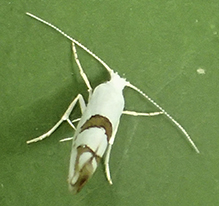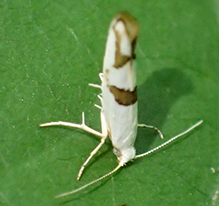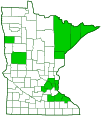cherry shoot borer moth
(Argyresthia oreasella)
Conservation • Description • Habitat • Ecology • Distribution • Taxonomy
|
||||||||
| Hodges # | 2467 |
|||||||
Conservation Status |
||||||||
| IUCN Red List | not listed |
|||||||
| NatureServe | NNR - Unranked SNR - Unranked |
|||||||
| Minnesota | not listed |
|||||||
Description |
||
Cherry shoot borer moth is a common, small, shiny headstand moth. In the United States, it occurs in the east from Maine to northern Georgia, west to Minnesota and Mississippi, and in the west from Washington to western Montana. There is also an isolated population in Colorado. In southern Canada it occurs from Nova Scotia to British Columbia. The larvae are leaf miners of trees and shrubs in the Rosaceae (rose) family, including apple, chokecherry, hawthorn, pin cherry, and serviceberry, and possibly also of oak. They feed between the upper and lower surfaces of a leaf and leave a visible trail (mine). Adults are active from late June to mid-August. Adults are ¼″ (6 mm) in length and have a ½″ (13 mm) wingspan. They are silvery white with somewhat variable metallic gold and dark brown markings. The head is white. The antennae are long, about two-thirds the length of the forewings. They are white and they have a narrow dark brown band on each segment. On the male they are finely toothed and hairy. The finger-like sensory mouthparts (labial palps) are silvery white, moderately long, extended forward, slightly curved, and pointed. The thorax is white. The forewings are long and narrow, and they are pointed at the end. There is a gold streak near the leading edge (costal margin) in the basal area. At the midpoint of the wing, there is a broad gold band bordered above and below with a dark brown line. The band is slightly oblique and incomplete. It does not reach the costal margin but is replaced there with two golden brown dots. Just beyond the dots, a narrower, strongly oblique, golden band extends from the costal margin to the anal angle. From the middle of this band, a broad branch extends toward the wingtip. Before reaching the tip, the branch splits into three smaller branches, one extending to the costal margin, one to the outer margin, and one to the inner margin. The fringe is long and dark golden brown. The hindwings are dark gray. |
||
Size |
||
Total length: ¼″ (6 mm) Wingspan: ½″ (13 mm) |
||
Similar Species |
||
Habitat and Hosts |
||
Trees and shrubs in the Rosaceae (rose) family, including apple, chokecherry, hawthorn, pin cherry, and serviceberry, and possibly also oak |
||
Ecology |
||
Season |
||
Late June to mid-August |
||
Behavior |
||
Adults rest with the head down, the antennae held outward, and the rear of the body and the wings elevated at an angle or almost perpendicular to the surface – the headstand position.. |
||
Life Cycle |
||
Eggs overwinter on leaf buds. |
||
Larva Food |
||
Inner leaf tissue |
||
Adult Food |
||
|
||
Distribution |
||||
|
Sources |
|||
| 12/5/2023 | ||||
Occurrence |
||||
Common |
||||
Taxonomy |
|||
Order |
Lepidoptera (Butterflies and Moths) | ||
Superfamily |
Yponomeutoidea (ermine moths and allies) | ||
Family |
Argyresthiidae (shiny headstand moths) | ||
Subfamily |
Argyresthiinae | ||
Genus |
Argyresthia (argent) | ||
Synonyms |
|||
Argyresthia andereggiella Argyresthia anduegiella Argyresthia oreadella |
|||
Common Names |
|||
cherry shoot borer cherry shoot borer moth |
|||
Glossary
Anal angle
In insects: The angle at the corner of a wing formed where the outer and inner margins meet.
Costal margin
The leading edge of the forewing of insects.
Visitor Photos |
|||||
Share your photo of this insect. |
|||||
| This button not working for you? Simply email us at info@MinnesotaSeasons.com. Attach one or more photos and, if you like, a caption. |
|||||
Babette Kis |
|||||
Argyresthia oreasella cherry shoot borer moth Argyresthia oreasella, cherry shoot borer moth, on Solomon's seal leaf, hedgerow next to Barnes Prairie, Racine Co., WI. A number of Prunus serotina, wild cherry trees are in this section of the hedgerow. This moth is about 4 mm long, and noticeable due to its contrasting colors and head-down resting position. Photos were taken on July 5, 2022. |
 |
||||
 |
|||||
MinnesotaSeasons.com Photos |
|||||
|
|||||

Slideshows |
||

Visitor Videos |
|||
Share your video of this insect. |
|||
| This button not working for you? Simply email us at info@MinnesotaSeasons.com. Attach a video, a YouTube link, or a cloud storage link. |
|||
Other Videos |
|||


Created: 12/5/2023
Last Updated:

